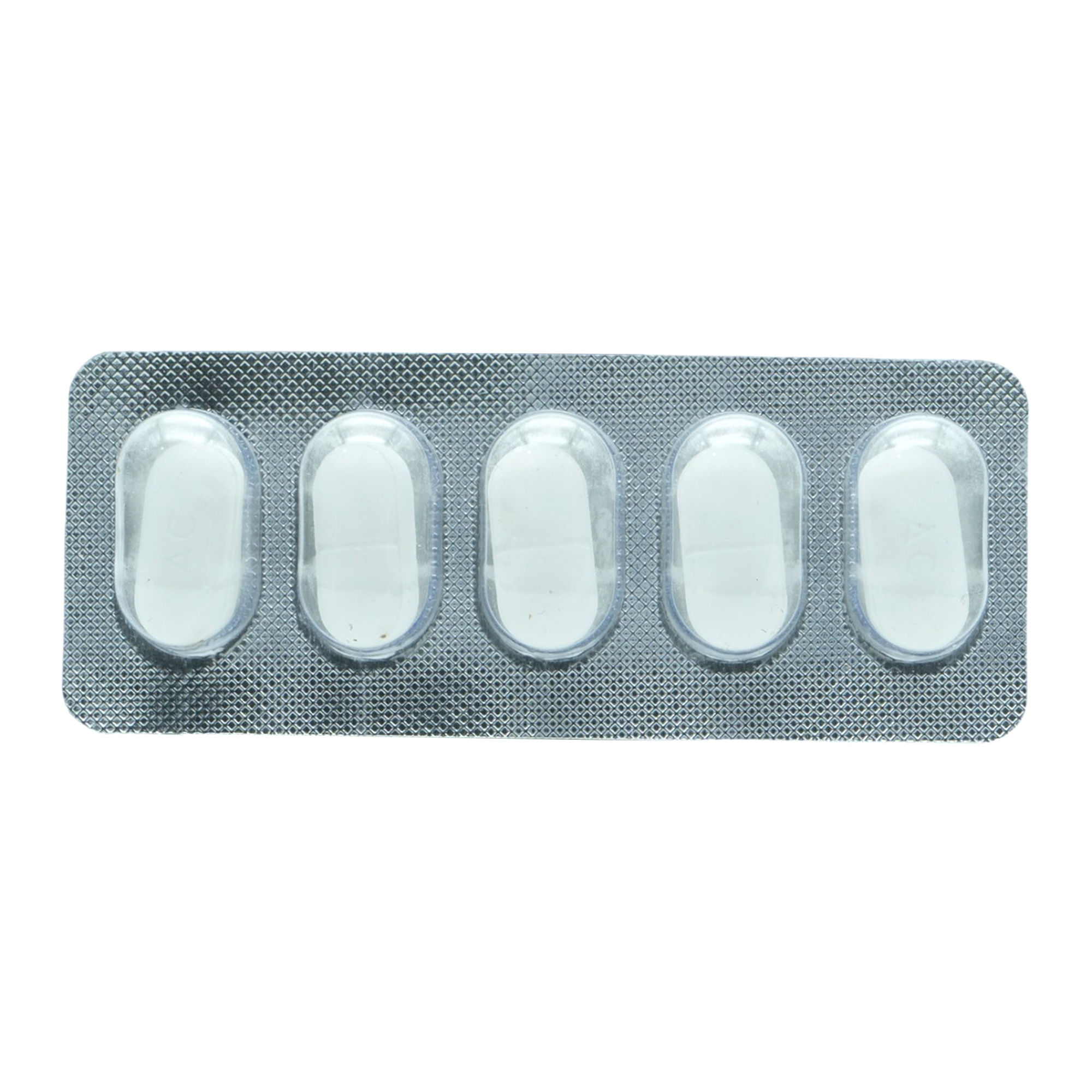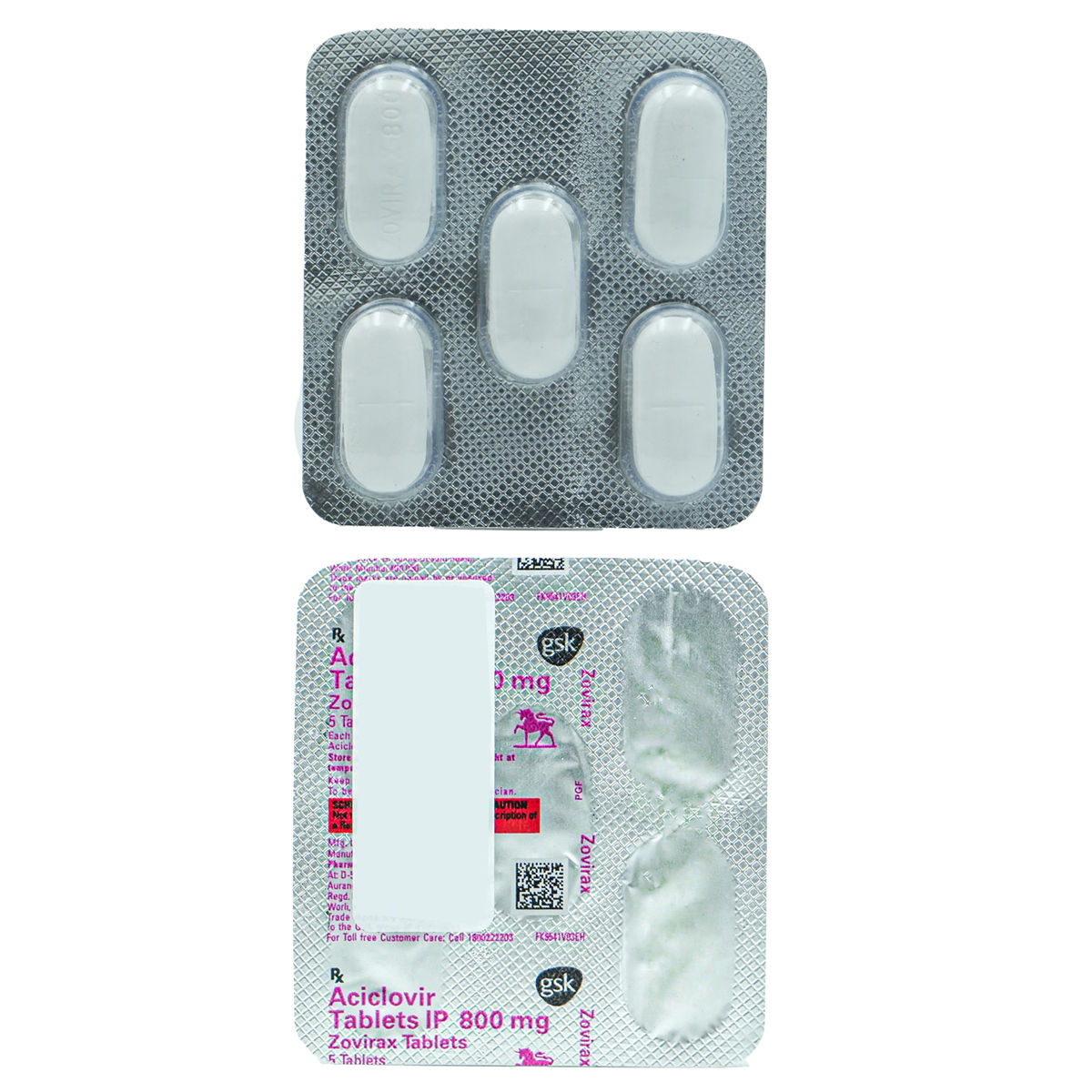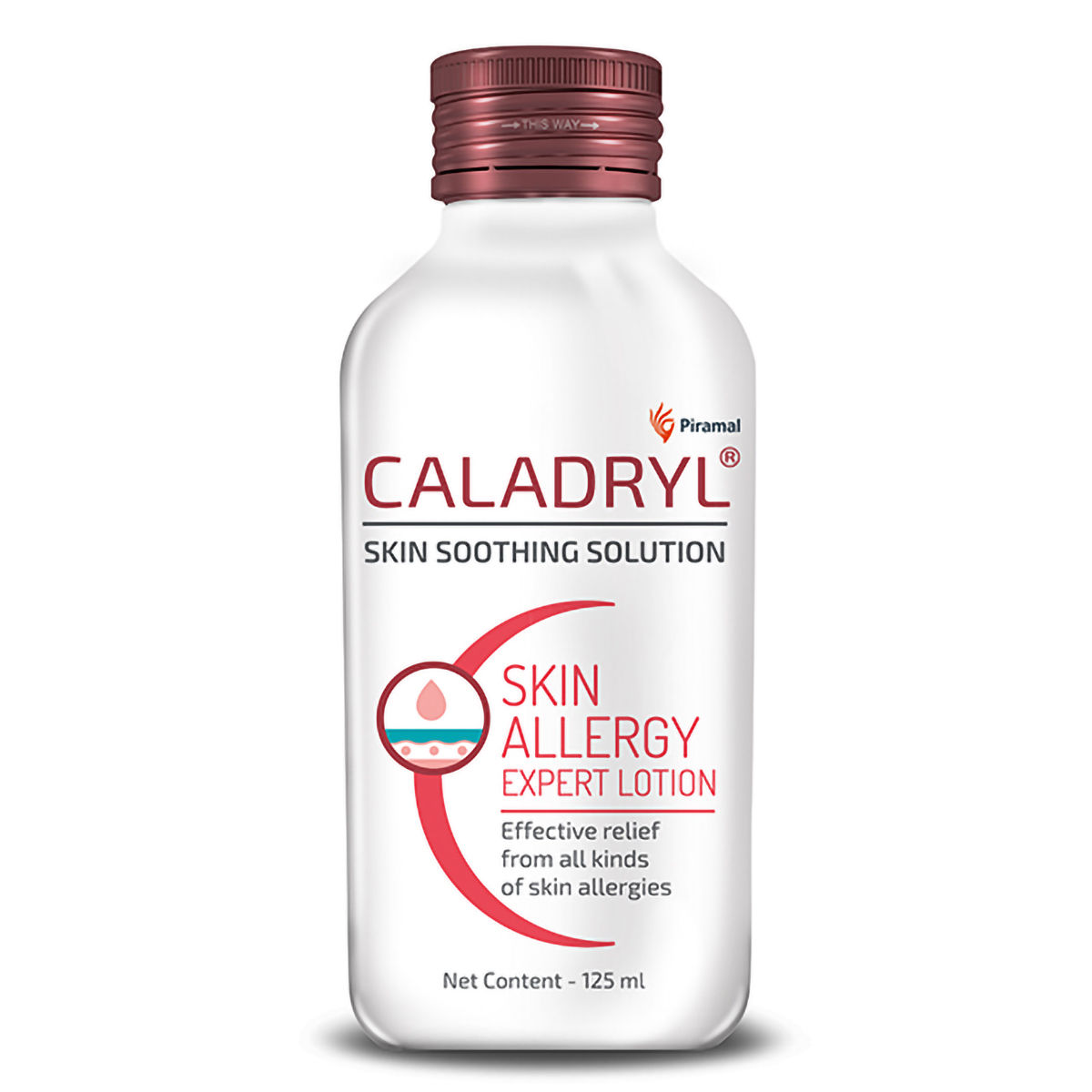एसीविर-800 डीटी टैबलेट 5
Write a Review


Selected Pack Size:5
5 ₹189.5
(₹37.9 per unit)
In Stock
10 ₹421.5
(₹42.15 per unit)
In Stock
₹189.5*
MRP ₹210.5
10% off
₹178.92*
MRP ₹210.5
15% CB
₹31.58 cashback(15%)
Free Delivery
With Circle membership
(Inclusive of all Taxes)
This offer price is valid on orders above ₹800. Apply coupon PHARMA10/PHARMA18 (excluding restricted items)
Written By Bayyarapu Mahesh Kumar , M Pharmacy
Reviewed By Dr Aneela Siddabathuni , MPharma., PhD
Acivir-800 DT Tablet is used to treat viral infections. It plays a vital role in treating cold sores (an inflamed blister in or near the mouth, caused by infection with the herpes simplex virus), genital herpes (a common sexually transmitted infection marked by genital pain and sores), and herpes zoster (a viral infection that causes a painful rash). In addition to this, it is also used to treat chickenpox. It contains Aciclovir, which prevents the multiplication of viruses in human cells by acting on their DNA, resulting in decreased viral overload. In some cases, you may experience side effects such as headaches, feeling dizzy, nausea or vomiting, diarrhoea, rash, and skin sensitivity to sunlight. Use protection while having sexual intercourse to avoid the transfer of genital herpes (a sexually transmitted disease) to your partner.
Know Your Delivery Time
Provide Delivery Location
 Prescription drug
Prescription drugWhats That

Secure Payment

India's Most Trusted Pharmacy

Genuine Products
Side effects of Acivir-800 DT Tablet
Overcome Medication-Induced Nausea: A 9-Step Plan
- Inform your doctor about the nausea and discuss possible alternatives to the medication or adjustments to the dosage.
- Divide your daily food intake into smaller, more frequent meals to reduce nausea.
- Opt for bland, easily digestible foods like crackers, toast, plain rice, bananas, and applesauce.
- Avoid certain foods that can trigger nausea, such as fatty, greasy, spicy, and smelly foods.
- Drink plenty of fluids, such as water, clear broth, or electrolyte-rich beverages like coconut water or sports drinks.
- Use ginger (tea, ale, or candies) to help relieve nausea.
- Get adequate rest and also avoid strenuous activities that can worsen nausea.
- Talk to your doctor about taking anti-nausea medication if your nausea is severe.
- Record when your nausea occurs, what triggers it, and what provides relief to help you identify patterns and manage your symptoms more effectively.
To prevent, manage, and treat Constipation caused by medication usage, follow these steps:
- Preventing Vomiting (Before it Happens)
- Take medication exactly as prescribed by your doctor. This can help minimize side effects, including vomiting.
- Having a small meal before taking your medication can help reduce nausea and vomiting.
- Talk to your doctor about taking anti-nausea medication along with your prescribed medication.
- Managing Vomiting (If it Happens)
- Try taking ginger in the form of tea, ale, or candy to help alleviate nausea and vomiting.
- What to Do if Vomiting Persists
- Consult your doctor if vomiting continues or worsens, consult the doctor for guidance on adjusting your medication or additional treatment.
Here are the precise steps to cope with diarrhoea caused by medication usage:
- Inform Your Doctor: Notify your doctor immediately about your diarrhoea symptoms. This allows them to adjust your medication or provide guidance on managing side effects.
- Stay Hydrated: Drink plenty of fluids to replace lost water and electrolytes. Choose water, clear broth, and electrolyte-rich drinks. Avoid carbonated or caffeinated beverages to effectively rehydrate your body.
- Follow a Bland Diet: Eat easy-to-digest foods to help firm up your stool and settle your stomach. Try incorporating bananas, rice, applesauce, toast, plain crackers, and boiled vegetables into your diet.
- Avoid Trigger Foods: Steer clear of foods that can worsen diarrhoea, such as spicy, fatty, or greasy foods, high-fibre foods, and dairy products (especially if you're lactose intolerant).
- Practice Good Hygiene: Maintain good hygiene to prevent the spread of infection. To stay healthy, wash your hands frequently, clean and disinfect surfaces regularly, and avoid exchanging personal belongings with others.
- Take Anti-Diarrheal Medications: If your doctor advises, anti-diarrheal medications such as loperamide might help manage diarrhoea symptoms. Always follow your doctor's directions.
- Keep track of your diarrhoea symptoms. If they don't get better or worse or are accompanied by severe stomach pain, blood, or dehydration signs (like extreme thirst or dark urine), seek medical help.
- Drink water or other clear fluids.
- To prevent worsening of pain, limit intake of tea, coffee, or alcohol.
- Include bland foods like rice, toast, crackers, and rice in your diet.
- Avoid lying down immediately after eating as it may cause indigestion or heartburn.
- Avoid acidic and spicy food as it may cause indigestion.
Dealing with Medication-Induced Headache:
- Hydrate your body: Drink enough water to prevent dehydration and headaches.
- Calm Your Mind: Deep breathing and meditation can help you relax and relieve stress.
- Rest and Recharge: Sleep for 7-8 hours to reduce headache triggers.
- Take rest: lie down in a quiet, dark environment.
- Cold or warm compresses can help reduce tension.
- Stay Upright: Maintain good posture to keep symptoms from getting worse.
- To treat headaches naturally, try acupuncture or massage therapy.
- Over-the-counter pain relievers include acetaminophen and ibuprofen.
- Prescription Assistance: Speak with your doctor about more substantial drug alternatives.
- Severe Headaches: Seek emergency medical assistance for sudden, severe headaches.
- Frequent Headaches: If you get reoccurring headaches, consult your doctor.
- Headaches with Symptoms: Seek medical attention if your headaches include fever, disorientation, or weakness.
Here are the 7 steps to manage Dizziness caused by medication:
- Inform your doctor about dizziness symptoms. They may adjust your medication regimen or prescribe additional medications to manage symptoms.
- Follow your doctor's instructions for taking medication, and take it at the same time every day to minimize dizziness.
- When standing up, do so slowly and carefully to avoid sudden dizziness.
- Avoid making sudden movements, such as turning or bending quickly, which can exacerbate dizziness.
- Drink plenty of water throughout the day to stay hydrated and help alleviate dizziness symptoms.
- If you're feeling dizzy, sit or lie down and rest until the dizziness passes.
- Track when dizziness occurs and any factors that may trigger it, and share this information with your doctor to help manage symptoms.
Managing Medication-Triggered Erythema (Redness of the Skin or Skin redness): A Step-by-Step Guide:
- Consult your doctor if you experience skin redness, itching, or irritation after taking medication.
- Your doctor may adjust your treatment plan by changing your medication or providing guidance on managing your erythema symptoms.
- Your doctor may recommend or prescribe certain medications to help alleviate symptoms.
- Apply cool compresses or calamine lotion to the affected skin area to reduce redness and itching.
- Stay hydrated by drinking plenty of water to help alleviate symptoms and keep your skin hydrated.
- Monitor your skin condition closely and promptly report any changes, worsening symptoms, or concerns to your healthcare provider.
Drug-Drug Interactions
AciclovirIodamide
Severe
Drug-Drug Interactions
Login/Sign Up
How does the drug interact with Acivir-800 DT Tablet:
Co-administration of Cidofovir with Acyclovir can increase the risk of kidney problems.
How to manage the interaction:
Taking Acivir-800 DT Tablet with Cidofovir is not recommended, please consult your doctor before taking it. You should consult a doctor if you experience vomiting, irregular urination, sudden weight gain or loss, swelling, shortness of breath, muscle cramps, weakness, and palpitations. Do not stop using any medications without talking to a doctor.
Co-administration of Cidofovir with Acyclovir can increase the risk of kidney problems.
How to manage the interaction:
Taking Acivir-800 DT Tablet with Cidofovir is not recommended, please consult your doctor before taking it. You should consult a doctor if you experience vomiting, irregular urination, sudden weight gain or loss, swelling, shortness of breath, muscle cramps, weakness, and palpitations. Do not stop using any medications without talking to a doctor.
AciclovirIodamide
Severe
How does the drug interact with Acivir-800 DT Tablet:
Coadministration of Iodamide contrast with Acivir-800 DT Tablet may increase the risk or severity of kidney injury.
How to manage the interaction:
Before undergoing any imaging procedure let your doctor know you are on Acivir-800 DT Tablet treatment.
Coadministration of Iodamide contrast with Acivir-800 DT Tablet may increase the risk or severity of kidney injury.
How to manage the interaction:
Before undergoing any imaging procedure let your doctor know you are on Acivir-800 DT Tablet treatment.
Severe
How does the drug interact with Acivir-800 DT Tablet:
Co-administration of Acivir-800 DT Tablet with tacrolimus may increase the risk or severity of kidney problems.
How to manage the interaction:
Coadministration of Acivir-800 DT Tablet with Tacrolimus can result in an interaction, it can be taken if your doctor has advised it. Contact a doctor immediately if you experience signs such as decreased or increased urine output, sudden weight gain or loss, swelling, or shortness of breath. Do not discontinue any medications without first consulting a doctor.
Co-administration of Acivir-800 DT Tablet with tacrolimus may increase the risk or severity of kidney problems.
How to manage the interaction:
Coadministration of Acivir-800 DT Tablet with Tacrolimus can result in an interaction, it can be taken if your doctor has advised it. Contact a doctor immediately if you experience signs such as decreased or increased urine output, sudden weight gain or loss, swelling, or shortness of breath. Do not discontinue any medications without first consulting a doctor.
Severe
How does the drug interact with Acivir-800 DT Tablet:
Coadministration of Acivir-800 DT Tablet with Amphotericin B can increase the risk or severity of kidney disorder.
How to manage the interaction:
Taking Acivir-800 DT Tablet with Amphotericin b together can result in an interaction, it can be taken if a doctor has advised it. Consult a doctor if you experience irregular urination, muscle ache, shortness if breath, or palpitations. Do not discontinue any medications without consulting a doctor.
Coadministration of Acivir-800 DT Tablet with Amphotericin B can increase the risk or severity of kidney disorder.
How to manage the interaction:
Taking Acivir-800 DT Tablet with Amphotericin b together can result in an interaction, it can be taken if a doctor has advised it. Consult a doctor if you experience irregular urination, muscle ache, shortness if breath, or palpitations. Do not discontinue any medications without consulting a doctor.
Severe
How does the drug interact with Acivir-800 DT Tablet:
Coadministration of Acivir-800 DT Tablet with Everolimus may increase the risk or severity of kidney injury.
How to manage the interaction:
Taking Acivir-800 DT Tablet with Everolimus together can result in an interaction, it can be taken if a doctor has advised it. Contact a doctor immediately if you experience vomiting, irregular urination, sudden weight gain or loss, swelling, breathing difficulty, muscle pains, dizziness, or palpitations. Do not discontinue any medications without consulting a doctor.
Coadministration of Acivir-800 DT Tablet with Everolimus may increase the risk or severity of kidney injury.
How to manage the interaction:
Taking Acivir-800 DT Tablet with Everolimus together can result in an interaction, it can be taken if a doctor has advised it. Contact a doctor immediately if you experience vomiting, irregular urination, sudden weight gain or loss, swelling, breathing difficulty, muscle pains, dizziness, or palpitations. Do not discontinue any medications without consulting a doctor.
How does the drug interact with Acivir-800 DT Tablet:
Coadministration of Acivir-800 DT Tablet with Sirolimus may increase the risk or severity of kidney injury.
How to manage the interaction:
Taking Acivir-800 DT Tablet with Sirolimus can result in an interaction, it can be taken if your doctor has advised it. However, if you experience vomiting, a decrease in hunger, irregular urine, weight gain or loss, swelling, difficulty breathing, muscle pain, or weakness, consult a doctor.
Coadministration of Acivir-800 DT Tablet with Sirolimus may increase the risk or severity of kidney injury.
How to manage the interaction:
Taking Acivir-800 DT Tablet with Sirolimus can result in an interaction, it can be taken if your doctor has advised it. However, if you experience vomiting, a decrease in hunger, irregular urine, weight gain or loss, swelling, difficulty breathing, muscle pain, or weakness, consult a doctor.
AciclovirMetrizamide
Severe
How does the drug interact with Acivir-800 DT Tablet:
Coadministration of Metrizamide in contrast with Acivir-800 DT Tablet may increase the risk or severity of kidney disorder.
How to manage the interaction:
Before undergoing any imaging procedure, let your doctor know you are on Acivir-800 DT Tablet treatment. Look out for signs such as vomiting, increased or decreased urination, sudden weight gain or loss, swelling, shortness of breath, muscle cramps, or weakness. Consult the doctor immediately.
Coadministration of Metrizamide in contrast with Acivir-800 DT Tablet may increase the risk or severity of kidney disorder.
How to manage the interaction:
Before undergoing any imaging procedure, let your doctor know you are on Acivir-800 DT Tablet treatment. Look out for signs such as vomiting, increased or decreased urination, sudden weight gain or loss, swelling, shortness of breath, muscle cramps, or weakness. Consult the doctor immediately.
How does the drug interact with Acivir-800 DT Tablet:
Coadministration of Acivir-800 DT Tablet with Tenofovir alafenamide may increase the risk or severity of kidney injury.
How to manage the interaction:
Taking Acivir-800 DT Tablet with tenofovir alafenamide can result in an interaction. However, if the benefits outweigh the risks, your doctor will prescribe them. Contact a doctor immediately if you experience symptoms such as decreased or increased urine output, sudden weight gain or loss, swelling, or shortness of breath. Do not discontinue any medication without consulting your doctor.
Coadministration of Acivir-800 DT Tablet with Tenofovir alafenamide may increase the risk or severity of kidney injury.
How to manage the interaction:
Taking Acivir-800 DT Tablet with tenofovir alafenamide can result in an interaction. However, if the benefits outweigh the risks, your doctor will prescribe them. Contact a doctor immediately if you experience symptoms such as decreased or increased urine output, sudden weight gain or loss, swelling, or shortness of breath. Do not discontinue any medication without consulting your doctor.
How does the drug interact with Acivir-800 DT Tablet:
Coadministration of Acivir-800 DT Tablet with Tenofovir Disoproxil may increase the risk or severity of kidney disorder.
How to manage the interaction:
Coadministration of Acivir-800 DT Tablet with Tenofovir disoproxil can result in an interaction, it can be taken when your doctor has advised it. Contact a doctor immediately if you experience decreased or increased urine output, sudden weight gain or loss, swelling, or shortness of breath. Do not discontinue any medications without consulting a doctor.
Coadministration of Acivir-800 DT Tablet with Tenofovir Disoproxil may increase the risk or severity of kidney disorder.
How to manage the interaction:
Coadministration of Acivir-800 DT Tablet with Tenofovir disoproxil can result in an interaction, it can be taken when your doctor has advised it. Contact a doctor immediately if you experience decreased or increased urine output, sudden weight gain or loss, swelling, or shortness of breath. Do not discontinue any medications without consulting a doctor.
Severe
How does the drug interact with Acivir-800 DT Tablet:
Concomitant use of Acivir-800 DT Tablet with Tizanidine can increase the risk of developing low blood pressure.
How to manage the interaction:
Coadministration of Acivir-800 DT Tablet with Tizanidine can result in an interaction, but it can be taken if your doctor has advised it. Contact a doctor immediately if you experience signs such as dizziness, excessive sweating, or palpitations. Do not discontinue any medications without consulting a doctor.
Concomitant use of Acivir-800 DT Tablet with Tizanidine can increase the risk of developing low blood pressure.
How to manage the interaction:
Coadministration of Acivir-800 DT Tablet with Tizanidine can result in an interaction, but it can be taken if your doctor has advised it. Contact a doctor immediately if you experience signs such as dizziness, excessive sweating, or palpitations. Do not discontinue any medications without consulting a doctor.
Drug-Food Interactions
No Drug - Food interactions found in our database. Some may be unknown. Consult your doctor for what to avoid during medication.
Drug-Food Interactions
Login/Sign Up
Product Substitutes

Have a query?
FAQs
Customers Also Bought
Disclaimer
While we strive to provide complete, accurate, and expert-reviewed content on our 'Platform', we make no warranties or representations and disclaim all responsibility and liability for the completeness, accuracy, or reliability of the aforementioned content. The content on our platform is for informative purposes only, and may not cover all clinical/non-clinical aspects. Reliance on any information and subsequent action or inaction is solely at the user's risk, and we do not assume any responsibility for the same. The content on the Platform should not be considered or used as a substitute for professional and qualified medical advice. Please consult your doctor for any query pertaining to medicines, tests and/or diseases, as we support, and do not replace the doctor-patient relationship.
Author Details
We provide you with authentic, trustworthy and relevant information
Recommended for a 30-day course: 6 Strips
Buy Now
Add 6 Strips























